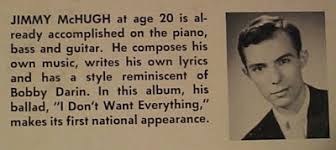“After all, what does it mean to be a star in Des Moines, Iowa?”
— 1970s recording artist from Des Moines
For many years, our garage was home to a plywood replica of a giant LP record about four feet in diameter and two inches thick. The “vinyl” grooves were painted in circles around a bright red label in the center: Success Records.
Success Records had little success. Based in Des Moines, Iowa, Success Records released 10 singles and, in 1963, a compilation album entitled “”Only For Teenagers and Real Swinging Adults” featuring Jimmy McHugh, The Blendtones, The Extensions, The Martinels, Oscar Boyd and Cicero Blake.
In the era of the Top 40 charts, Success Records ran an ad in Billboard magazine urging the music business to “Watch These Monsters.” The Blendtones’ dance song “The Slide” charted in San Bernadino and their song “The Lovers” reached #6 on an AM station in Los Angeles.
Jimmy McHugh, a student at Drake University, reached the local charts in Pittsburgh, PA with a doo wop song, “I Don’t Want Everything,” that had everything anyway: angelic female choir, vocal melisma and falsetto from Jimmy and even a talking section where Jimmy laid it all out plain and simple (“Oh, please darling…”) On the flip side of this monster was “Do the Kangaroo,” a dance craze to replace the bird and the pony, perfect for a 1963 sock hop.
Somehow Jimmy’s 45 rpm recording crossed the ears of another Jimmy McHugh, a composer dubbed one of the “greats of the music world.” Collaborating with lyricist Dorothy Fields, McHugh the elder wrote such jazz classics as “I Can’t Give You Anything But Love, Baby.” “On the Sunny Side of the Street” and “Digga Digga Doo.” He started out as an accompanist at the Boston Opera House and then performed as one of the Hotsy Totsy Boys. By the time he died in 1969, McHugh the elder had composed music for motion pictures and 16 Broadway musicals.
In 1963, McHugh the elder lived regally in Beverly Hills, a toast of Hollywood and the subject of gossip columns. Fond of his news clips, he spotted his own name in Billboard, right in the Success Records’ ad shouting “Watch these Monsters.” McHugh the elder secured the recording and something about Jimmy the younger’s doo wop song tickled his fancy. So, he dropped his namesake a letter ending with “After all, we McHughs must stick together.”
In his senior year, studying journalism at Drake University in Des Moines, the letter must have fallen on young Jimmy like a summons from God. Here was an answer to his dreams: one of the most successful songwriters offering to open doors for him. Jimmy the younger picked up the phone that fall and made the expensive long distance call to Beverly Hills.
Is the next movie star found at the corner drug store? Does the next Bobby Darin become famous through a phone call?
It’s not likely.
But, the two Jimmy McHughs must have connected on the phone for, on May 26, 1964, Jimmy the younger was on a plane to Hollywood for a two-week business tour. He may have performed on the Steve Allen show (another graduate of Drake University.) He may have talked about contracts or songwriting or a show biz future. But, Jimmy the younger had to be back by June 8 to finish classes.
On June 9, an advertising headline in the Des Moines Register read: “Follow the Crowds/See and Hear/The Fabulous Jimmy McHugh Trio” at the Jungle Club on Fifth Avenue in downtown Des Moines. He was featured at the Stage Door as one of “two big acts.” He was “vocal and piano supreme” followed by a ventriloquist act. Doo wop style faded in popularity. Discotheques appeared in the Des Moines entertainment ads. One ad for Jimmy McHugh appears next to an article about Queen Elizabeth awarding the Member of the Order of the British Empire to “four young men without haircuts”—the Beatles.
Twenty years later in 1985, Jimmy the younger was interviewed in The Times—the Times of Muncie. He was “Back Home in Indiana” not far from his boyhood home of Hammond. He was drawing dance crowds six nights a week at a dinner and dancing club in Highland, Indiana. Under the headline “Hitting the Nigh Notes,” Jimmy the younger says:
“People come here to dance and I give them the music.
I’m trying to do the best job I can. I’m not trying to be discovered. I’m lucky to be doing what I’m doing.”
He had a taste of Hollywood in 1964, a glimmer of hope for a dream. Did he have regrets?
“I don’t have those kinds of aspirations anymore, it’s very easy to have your bubble burst. Besides I can’t see myself living on Pepsi Colas and cupcakes anymore just to go out and try to make it big.”
Twenty three years after that interview, in 2008, Jimmy the younger—though he is 65 by then—is advertised as a local piano instructor presenting a piano recital and singalong for the Victory Centre of River Oaks, a senior living facility. At Easter, while kids and seniors dyed eggs, made Easter cards and wove baskets, he performed outdoors, weather permitting.
Imagination easily leads to big dreams. But, you can live your dreams without expecting to be at the top of success.
Jimmy McHugh the elder was famous. But, Jimmy the younger is also one of the greats of the music world. He never quit playing music. He never stopped “trying to do the best job I can.”
Hollywood movies need music. But, people need music, too—in Des Moines, Iowa; Highland, Indiana; and, especially, at Victory Centre retirement community.
Success Records is long gone. The giant plywood record album has been hauled out of our garage to the dump. But, Jimmy McHugh turned out to be the success of Success Records.





